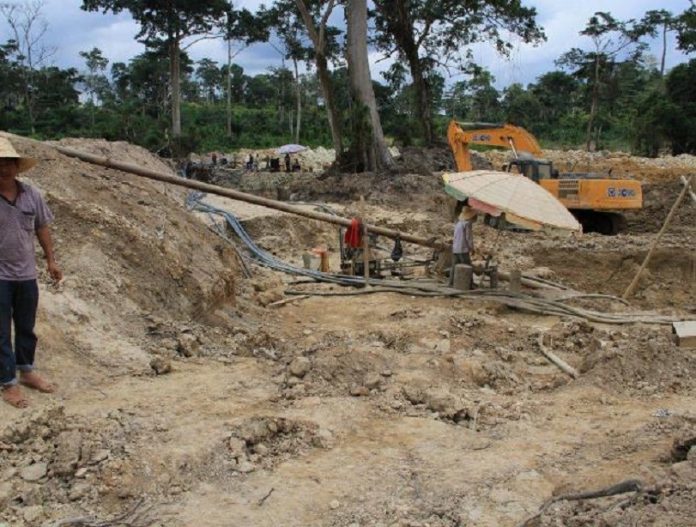The Federal Government of Nigeria, through the Ministry of Solid Minerals Development, yesterday, said that it has apprehended 300 illegal miners nationwide as part of efforts to revitalize the country’s mining sector.
It noted that increased global interest and rising revenue are further solidifying the solid minerals sector’s role as a driver of sustainable development.
The Minister of Solid Minerals Development, Dr. Dele Alake, disclosed this in Abuja, during a strategic briefing with the House Committee on Solid Minerals’ led by its Chairman, Garza Gbefwi, on an oversight visit to the Ministry’s headquarters.
Dr Alake outlined several transformative initiatives aimed at repositioning Nigeria’s mining sector, guided by the Ministry’s comprehensive Seven-Point Agenda.
He said: “This framework prioritizes securing mining operations, curbing illegal activities, and establishing the sector as a cornerstone of Nigeria’s economic growth.
“At the forefront of this transformation is a strengthened security framework designed to combat illegal mining, a longstanding challenge that has threatened both local communities and Nigeria’s global standing.
“Since deploying over 2,000 trained mine marshals, nearly 300 illegal operators, including foreign nationals, have been apprehended, significantly reducing unauthorized mining activity across the nation.”
The Minister credited this success to the proactive support of President Bola Tinubu, which facilitated inter-ministerial collaboration with the Ministry of Interior and ensured the rapid deployment of resources and personnel to safeguard mining areas.
He added, “This renewed security architecture is already having a profound impact,” Dr. Alake noted, describing the positive shift brought by reduced illegal operations.
‘’Our commitment to safeguarding our mining sites is also a commitment to Nigeria’s stability and an invitation to investors who seek reliable partnerships.” Beyond tackling illegal mining, the Ministry is focused on making Nigeria a global hub for mineral processing and trade.
‘Dr. Alake highlighted the strategic emphasis on value addition and in-country processing of minerals, which ensures more wealth is retained locally and reduces dependency on raw exports.
Alake expressed gratitude for the ongoing support from Nigeria’s legislative authorities and other key partners, emphasizing that these combined efforts are building a resilient foundation for the sector.
The Minister expressed optimism that with these reforms setting the stage for substantial economic contributions, Nigeria’s mining sector is on a trajectory to significantly bolster the nation’s Gross Domestic Product (GDP).
In his remarks, the Chairman of the Committee, Gbefwi, commended the Ministry’s achievements and pledged the Committee’s continued dedication to promoting transparency and growth in the sector.
Gbefwi noted that the Committee had adopted a more hands-on approach this year, engaging directly with agencies under the Ministry to identify achievements and challenges.
He acknowledged that agencies like the Nigerian Geological Survey Agency (NGSA) and the Solid Minerals Development Fund (SMDF) play crucial roles in the sector’s advancement.
He highlighted inadequate funding as a significant obstacle, particularly for the NGSA, whose mandate to generate geological data requires substantial resources.
He said: “Mineral exploration is a highly capital-intensive activity, and sufficient funding is critical to producing reliable data that can drive the sector forward. To that end, he advocated for increased funding to facilitate a seamless partnership between NGSA and SMDF, enabling both agencies to contribute effectively to sectoral growth.”
He called on the Federal Government to prioritize funding for its development and encouraged the Ministry to work closely with the President and other key stakeholders to secure resources that will foster the sector’s long-term sustainability and impact.
Gbefwi also recognized the Ministry’s progress, particularly in advancing the Seven-Point Agenda, saying that the Committee stands firmly in support of these efforts, and remains committed to partnering with it to transform Nigeria’s solid minerals sector into a significant contributor to the nation’s economy.
In her address, the Permanent Secretary of the Ministry, Dr. Mary Ogbe, expressed gratitude to the Committee for its consistent advocacy and support.
She acknowledged that legislative backing had been critical in empowering the Ministry to fulfil its mandate.
Ogbe said: “Together, we can achieve our shared objectives, particularly in increasing the sector’s contribution to Nigeria’s overall economic sustainability.”
She highlighted that the Ministry’s recent advancements, particularly in policy initiatives and community relations, are a result of the productive partnership with the Committee.
Dr. Ogbe reaffirmed the Ministry’s commitment to fostering a transparent and efficient environment for the solid minerals sector.
She opined that, with the House Committee’s ongoing aid, the Ministry would continue to drive progress, create jobs, and contribute to Nigeria’s economic diversification goals.


